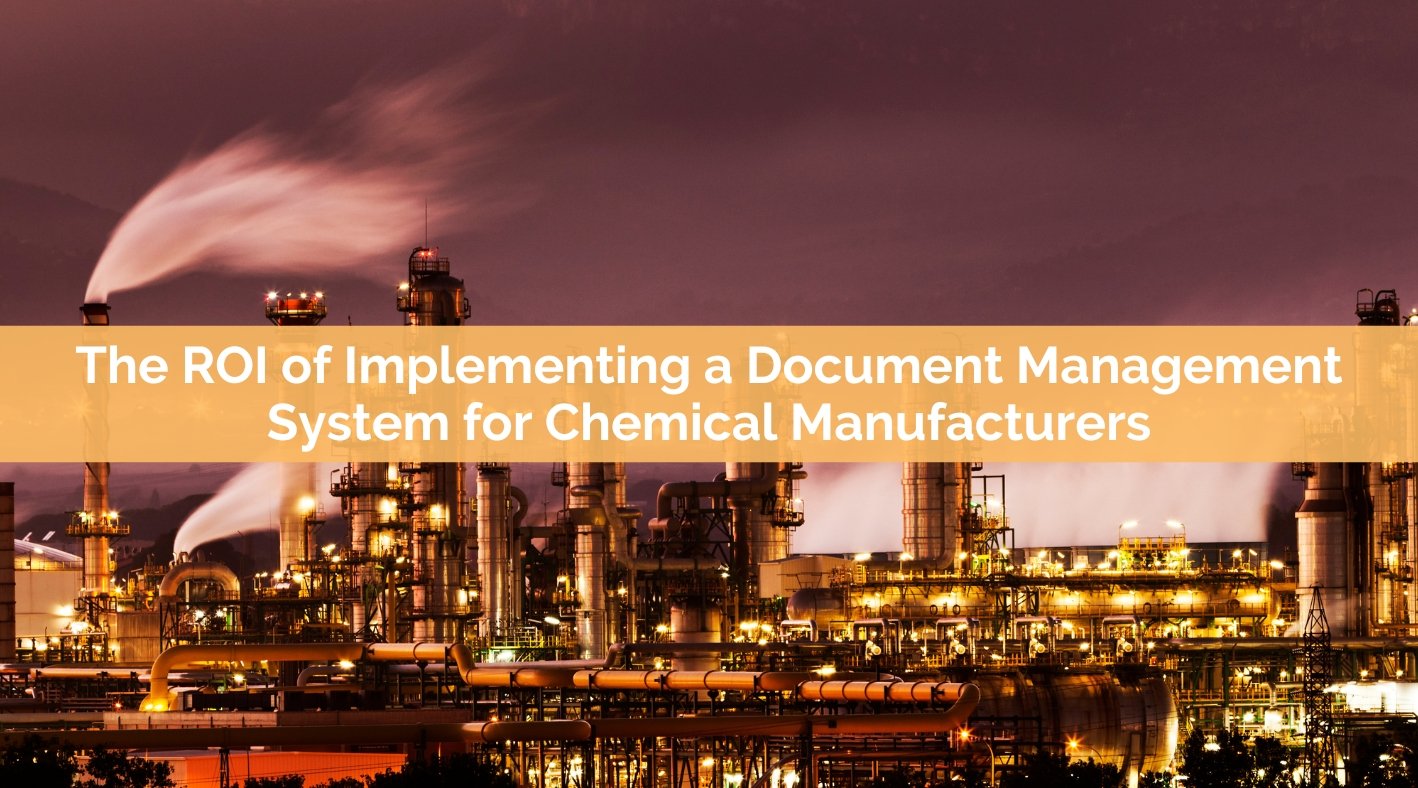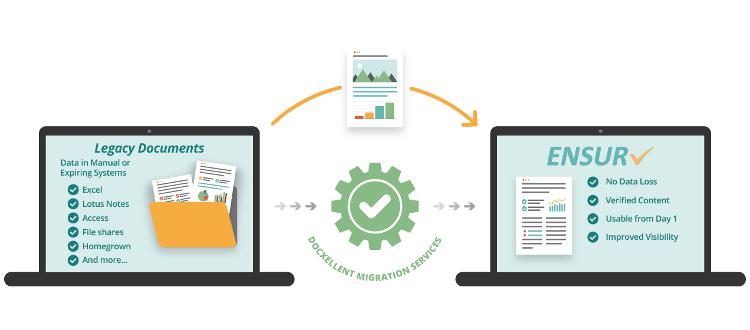
As chemical manufacturing regulatory requirements become increasingly stringent, companies are recognizing the importance of robust document management systems to streamline operations and drive success. This article explores the significance of document management for chemical manufacturers and delves into the challenges they face. Additionally, we’ll discuss the crucial concept of Return on Investment (ROI) and its relevance in document management.
Importance of Document Management for Chemical Manufacturers
Enhancing Regulatory Compliance and Documentation Requirements:
Chemical manufacturers operate in a heavily regulated environment, where adherence to stringent standards is paramount. A comprehensive document management system enables these companies to organize and maintain essential records, such as safety data sheets (SDS), Material Safety Data Sheets (MSDS), permits, licenses, and other compliance-related documents. By centralizing and automating documentation processes, chemical manufacturers can minimize non-compliance risk, reduce errors, and ensure swift access to critical information during audits and inspections.
Definition of ROI (Return on Investment) and Its Significance:
ROI is a financial metric used to measure the profitability and efficiency of an investment. In the context of document management, ROI represents the tangible and intangible benefits derived from implementing an effective system. These benefits include cost savings, increased productivity, improved collaboration, enhanced data security, and streamlined regulatory compliance. By understanding the significance of ROI, chemical manufacturers can make informed decisions about investing in document management solutions that yield long-term advantages.
Document Management Challenges in the Chemical Manufacturing Industry
Regulatory Compliance and Documentation Requirements:
Chemical manufacturers face a complex web of regulatory obligations, including compliance with environmental, health, and safety standards. The documentation required to meet these obligations is vast and ever-evolving. Document management systems equipped with features like automated workflows, version control, and robust auditing capabilities help companies stay up to date with regulatory changes, streamline approval processes, and maintain accurate records, ensuring compliance while reducing administrative burden.
Data Security and Confidentiality:
The chemical manufacturing industry deals with sensitive and proprietary information, including formulas, research data, customer details, and intellectual property. Protecting this information from unauthorized access, data breaches, and cyber threats is crucial. Document management systems with robust security measures, such as encryption, access controls, and audit trails, help chemical manufacturers safeguard their confidential data, ensuring compliance with data protection regulations and maintaining customer trust.
Information Retrieval and Accessibility:
Efficient information retrieval is critical for timely decision-making, troubleshooting, and effective collaboration. Traditional paper-based or decentralized document management methods can result in inefficiencies, such as manual searches, lost documents, and delays in accessing vital information. A centralized electronic document management system, like ENSUR, allows chemical manufacturers to quickly search, retrieve, and share documents, fostering collaboration, speeding up processes, and improving overall operational efficiency.
Version Control and Document Collaboration:
In chemical manufacturing, documents go through multiple iterations and require collaboration among various stakeholders, including scientists, engineers, regulatory experts, and quality control personnel. Managing versions, tracking changes, and ensuring everyone is working on the latest document is a significant challenge. Document management systems with version control capabilities enable seamless collaboration, preventing data inconsistencies, reducing errors, and facilitating efficient workflows.
Benefits of Implementing Document Management Systems
Streamlined Regulatory Compliance
- Centralized document repository for easy access and tracking: Implementing a document management system enables chemical manufacturers to centralize their documents in a secure digital repository. This centralized approach simplifies document organization and facilitates quick and easy access to critical information for compliance purposes. Documents can be categorized, tagged, and indexed, making it effortless to locate specific records when needed.
- Automated workflows for compliance processes: A high quality document management system offers automated workflow capabilities that streamline compliance processes. These systems can be configured to trigger approval processes, document reviews, and notifications, ensuring that all necessary steps are followed consistently. This automation reduces manual errors, accelerates approval cycles, and helps chemical manufacturers maintain compliance with regulatory requirements.
- Audit trail and version history for documentation: Document management systems maintain a comprehensive audit trail and version history for each document. This feature provides a clear record of document revisions, changes, and approvals. Having a detailed audit trail helps in demonstrating compliance during audits and regulatory inspections, giving chemical manufacturers a greater level of confidence, and reducing potential compliance risks.
Enhanced Data Security and Confidentiality
- Role-based access control and permission settings: Document management systems provide robust security features, including role-based access control and permission settings. These features ensure that only authorized individuals have access to sensitive documents. Access rights can be customized based on job roles, granting appropriate levels of access to different users. This helps prevent unauthorized viewing, editing, or sharing of confidential information.
- Encryption and secure storage of sensitive information: Document management systems employ encryption techniques to secure sensitive data both during transmission and while at rest. Encryption ensures that data remains protected from unauthorized access or breaches. Additionally, these systems provide secure storage mechanisms, including redundant backups, to safeguard against data loss due to hardware failures or disasters.
- Disaster recovery and data backup mechanisms: Document management systems often include robust disaster recovery and data backup mechanisms. These features ensure that critical documents are protected and can be recovered in the event of unexpected incidents, such as system failures or natural disasters. Regular backups and redundant storage options provide an added layer of security and peace of mind to chemical manufacturers.
Improved Information Retrieval and Accessibility
- Advanced search capabilities and metadata tagging: Document management systems offer advanced search functionalities, allowing users to quickly locate documents based on keywords, metadata tags, or specific criteria. This saves time and effort compared to manual searches through physical files or unorganized digital folders. Metadata tagging enables the categorization and organization of documents based on relevant attributes, further enhancing search accuracy and retrieval speed.
- Quick retrieval of documents for inspections and audits: In the event of inspections or audits, document management systems enable chemical manufacturers to retrieve necessary documents swiftly and efficiently. Rather than spending valuable time searching through piles of paper or scattered digital files, documents can be retrieved with just a few clicks. This expedites the compliance process, improves response time, and enhances overall regulatory readiness.
- Mobile access and remote collaboration for field personnel: Many document management systems offer mobile access and remote collaboration features, enabling field personnel to access and contribute to documents from anywhere. This capability is particularly valuable for chemical manufacturers with employees working in remote locations or on the go. Mobile access ensures that personnel have up-to-date information and can collaborate effectively, promoting efficiency and productivity.
Efficient Version Control and Document Collaboration
- Tracking changes and managing document revisions: Document management systems provide robust version control functionalities, allowing chemical manufacturers to track changes made to documents over time. Users can easily view and compare different versions, identify modifications, and restore previous versions if necessary. This promotes accuracy, eliminates confusion, and ensures that everyone is working on the most current document version.
- Simultaneous editing and real-time collaboration: Document management systems facilitate real-time collaboration among multiple users. Teams can work on the same document simultaneously, making edits and providing feedback in real-time. This fosters seamless collaboration, eliminates the need for manual merging of multiple versions, and enhances productivity.
- Document approval workflows and notifications: Document management systems streamline the approval process through automated workflows and notifications. Users can define approval paths, set deadlines, and receive notifications when a document requires review or approval. This eliminates manual follow-ups and delays, enabling faster decision-making and smoother document flow.
Calculating the ROI of Document Management Systems
Cost Savings
- Reduction in manual paperwork and printing costs: Implementing a document management system significantly reduces the reliance on manual paperwork and printing. By transitioning to digital documents, chemical manufacturers can save on paper, ink, printing equipment, and storage costs associated with physical documents.
- Minimization of compliance violations and associated penalties: Non-compliance with regulatory requirements can lead to costly penalties and fines. A robust document management system helps ensure regulatory compliance, minimizing the risk of violations and associated financial penalties.
- Time savings for employees in document-related tasks: Manual document-related tasks, such as searching for information, filing, and managing versions, can be time-consuming. By automating these tasks and improving accessibility, document management systems free up valuable employee time for more productive activities, leading to increased efficiency and cost savings.
Increased Productivity
- Faster document retrieval and improved decision-making: Document management systems enable quick and easy document retrieval through advanced search capabilities. Employees can access the information they need promptly, resulting in faster decision-making processes and improved productivity.
- Streamlined collaboration and communication: Collaboration is essential in the chemical manufacturing industry, involving multiple stakeholders across different departments. Document management systems facilitate seamless collaboration by enabling real-time document sharing, version control, and feedback mechanisms. This streamlines communication and accelerates project timelines, leading to increased productivity.
- Automation of repetitive tasks and workflows: Document management systems automate repetitive tasks such as document routing, approvals, and notifications. This automation eliminates manual interventions and reduces the time spent on administrative tasks, enabling employees to focus on more value-added activities, thereby boosting productivity.
Risk Mitigation
- Minimization of data breaches and security incidents: Document management systems provide robust security features, reducing the risk of data breaches and unauthorized access to sensitive information. By implementing encryption, access controls, and data backup mechanisms, chemical manufacturers can mitigate the potential financial and reputational risks associated with data breaches.
- Improved audit preparedness and regulatory compliance: With a centralized document repository, audit trails, and version control, document management systems enhance audit preparedness. Companies can easily locate and provide necessary documentation during regulatory inspections or audits, avoiding potential compliance issues and associated costs.
- Avoidance of costly errors and rework: Inaccurate or outdated documents can lead to costly errors, rework, and delays. Document management systems with version control and document approval workflows ensure that employees are working with the correct and up-to-date information, minimizing errors, and reducing the need for costly rework.
In an industry where compliance, data security, and operational efficiency are of paramount importance, chemical manufacturers are increasingly turning to robust document management solutions. Effective document management is vital for ensuring regulatory compliance, safeguarding sensitive information, and maximizing productivity. With the complexities of the chemical manufacturing industry, implementing a comprehensive document management system can revolutionize operations, streamline processes, and drive success.
From regulatory compliance to data security and collaboration, ENSUR offers tailored document management solutions that cater specifically to the unique needs of chemical manufacturers, enabling them to thrive in a competitive landscape. To learn more, contact us today.

Julie Rue Browne is the Senior Client Relations Manager at DocXellent. With a background in technology and a passion for problem-solving, Julie is dedicated to providing top-notch support to our customers. With her dedication, hard work, and genuine nature, Julie is an integral member of the DocXellent team, contributing to the company's continued growth and success. Learn more about Julie here.




























